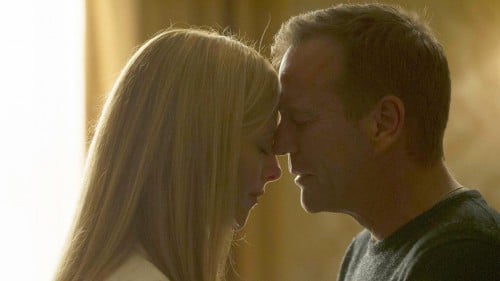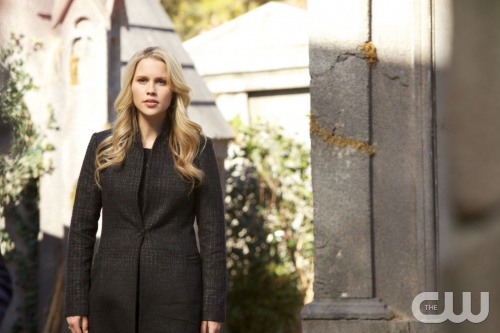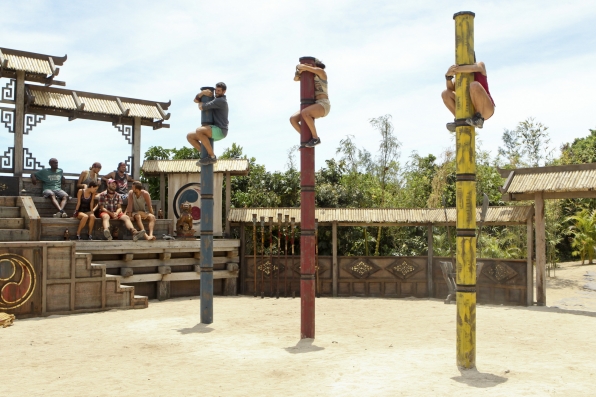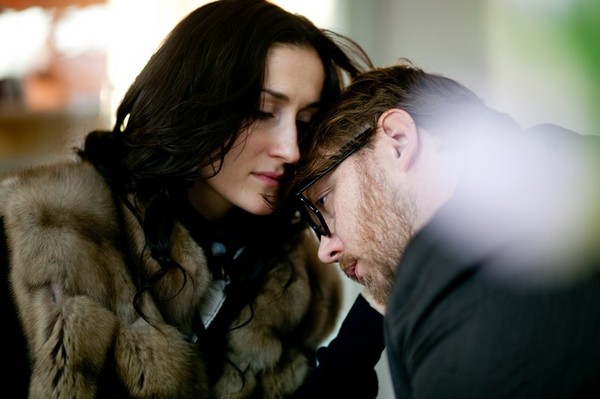One of TV’s most beloved romances is that of Logan and Veronica (affectionately termed “LoVe” by fans) from Rob Thomas’ cult classic Veronica Mars. The romance and the series had enough power and pull to drive a wildly successful Kickstarter and a reasonably successful film. Coming back to 24 for 24:LAD, it struck me for the first time that one of the most famous lines from the Veronica/Logan romance, while it doesn’t quite entirely fit that couple, does, seamlessly, describe Jack and Audrey.
“I thought our love was epic, you know? Spanning years, continents, lives lost, blood shed – epic.”
The scene is highly romantic, but the actual content of this famous line is not reflective of the couple’s relationship. Their romance does not include lives lost and blood shed, and while it does span years by the time the film comes around, the epic hyperbole of this statement is simply not reflective of the kind of stakes at play in the series.
Yet it’s a perfect description of the romance that Jack and Audrey live out and the kind of obstacles they overcome. Their romance literally spans continents – when Jack is captured by the Chinese Audrey travels to China to look for him, is captured, Jack returns to the U.S., and the two reunite a year later when Audrey is also brought back from Chin (and when the two reunite in Live Another Day, it’s in London). Their relationship also endures for five years, through lives lost and blood shed: Jack kills (or lets die) Audrey’s husband; Audrey is badly wounded during events Jack is caught up in, and later tortured by the Chinese for Jack’s sake. By the time the two reunite in London, their relationship has endured years of absence, violence, loss, and each thinking the other was dead. They’ve spent the majority of their relationship apart, have pulled through both thinking the other was dead, Audrey’s severe PTSD after her torture, and the past years of Jack being missing under the radar and Audrey married. Yet nothing has changed about their relationship – when they reunite for a few brief moments that connection still rings true, steady and certain as it always has for them. By the time Live Another Day comes along, you really do believe that nothing on earth can separate or overcome this couple.
Which is why it’s all the more puzzling that the show would choose to invest a great deal of careful writing and building of this relationship, allowing it to overcome multiple obstacles, only to have it end, suddenly and without resolution, in the mini-series. 24 is that very rare TV show in that is has always created extraordinarily high stakes for its characters. It’s a world of violence and loss in which no character is necessarily safe, and in the mist of and partly because of this, it was able to create it is second half one of the most tender, robust romantic relationships on the small screen. Because the stakes were so believably high for our couple, because the tension and the very real fear and worry of impending loss was ever-present and unrelenting, and because the writers allowed the relationship to unfold and endure through several seasons, it quickly turned into one of the few onscreen pairings that could accurately be described as “epic”. The lead couple’s stolen moments together illuminate and ground the series and them as characters, whether it’s just 5 minutes in a sickbay at CTU as Audrey pulls herself back together after an attack, or the tenuous connection of concern and human care they cast at each other in their many phone conversations as Jack speeds to another crime-scene or terrorist hideout. All of which is to say – the creative choice to unceremoniously kill the character is an odd one that makes little sense with all previous choices surrounding the relationship.
Furthermore, by killing the character, the series relegates Audrey to just another love interest: another of Jack’s loves who gets tragically killed for the sake of his story. No longer is she an equal half of a great love story, and no longer is she a fully threshed-out individual with a character arc of her own. Audrey Raines has a fascinating character arc – a woman raised in the cutthroat world of politics, yet a diplomat sheltered by a wealthy family, a woman raised in the heart of a civilized world, suddenly exposed to the depths of human violence and cruelty by her relationship with a counter-terrorism agent. A woman who despite her apparent fragility is unafraid to say no to anyone, who is ultimately able to see the truth of who Jack is and what he needs to be and accept him for exactly that, and a woman with ultimately pure iron in her soul who stabs a man holding a gun to her head, who steps up with courage despite fear in the midst of a dozen life-threatening situations, and who survives a year of physical and psychological torture by the Chinese, and comes back as collected and competent as ever to serve in her father’s administration.
Audrey Raines (Boudreau) isn’t a trained secret agent, unlike Sydney Bristow or Nikita or most of the other female leads we see in action-driven shows. What the show did, extraordinarily, was show how she could be incredibly strong without needing to kick ass to do it. Moreover, she was never portrayed as the helpless, feminine lead who “humanizes” the tough male lead. Nearly every scene between she and Jack either portrayed them drawing equal strength from each other, or involved Audrey telling Jack to go do what he needed to do.
Showrunner Manny Coto said in an interview that they had perceived Audrey’s storyline as a tragedy and wanted it to end that way, to which I call nonsense; there was rather an incredible amount of hope in the specific way the writers portrayed her overcoming the death of a spouse, torture and PTSD to come back stronger than ever, not broken but back to being a whole human being. For her to die ignonimously, and not in a way which particularly benefited her country, was a cop-out on the part of the show’s writers in dealing with a female character.
Finally – perhaps most disappointingly, by ending a complex, well-structured relationship in such a way, the 24 writers chose to play into a male-driven mythos that is as old as time: the lone wolf. We’ve all seen this before; the driven, ruthless man whose one love is taken from him, pushing him to focus completely on his mission and turn into a one-man killing machine. By ending Jack’s longest-running romantic relationship, the writers chose Jack the legend over Jack the man.
This is Jack as Bond, in which the girl is just a trope in the hero story, the tragic sacrifice that leverages the hero into who he needs to be – and forces him to stay there. Bond, in all film portrayals, is, and must be, alone. Romantic iterations come and they always go. 24 in Jack Baeur created a uniquely human Bond figure – Jack bleeds, he cries, he is terribly physically wounded, trammeled, ripped up – infinitely more than Bond and more than perhaps any other government agent before on the small screen. There’s a gritty realism to that aspect of the show, and it’s disappointing that this isn’t extended to all aspects of his character – that instead, his mystique, his persona, must be constantly maintained by his love interests always dying (at least in Bond, some of the women exit without having to be killed). There’s a bittersweet, long-running adage among 24 fans that Jack Baeur’s love interests always die. Starting with his wife in season 1, Jack’s love interests are always singled out from among other characters on the show for death. It may not be immediate, but it always arrives. Because ultimately, it is more important that Jack be the figure, that action hero, than that he weighed down by (particularly female) human connection. The misconception that surrounds the lone wolf is that he is, somehow, stronger alone.
Audrey’s death was a practical choice for the showrunners: it gave Jack a free hand (yet again) for next season (and odds are there will be a next season). It sets him free and opens up the boundaries of the stories they can tell to a certain extent. But it showed a profound lack of creative imagination, because this has all been done before. This isn’t a four-act tragedy in which things have been structured to lead up to that one terrible death. We’ve seen Jack’s women die multiple times before, seen him go through terrible grief and a cycle of revenge multiple times before, even for Audrey Raines herself when she was presumed dead in China. This death showed writers who were unable to break out of long-standing and worn-out patterns.
It also profoundly dehumanizes Jack and sets him up as that bloodless killing machine that Bond so often is: the man set apart, the man who is, ultimately, merely a government tool because he lives solely for the mission. For most of the history of 24, Jack lived for his job, but was humanized by his connection to Tony, to Chloe, to his wife and daughter, to Renee, and to Audrey, among others. I have already touched on the idea of these relationships, particularly that with Audrey, giving him strength rather than weakening him, but that isn’t the story being told ultimately, then or now. This final end to Jack’s longest romantic relationship sends the unmistakable message that now, if he wasn’t before, Jack is a character who is the myth and the machine rather than the man. Something has been profoundly lost in our hero.






